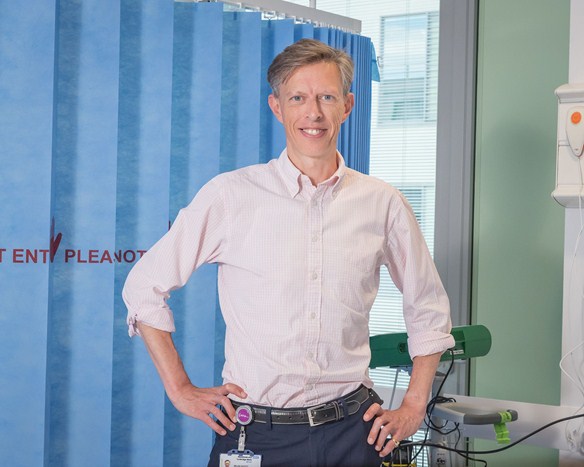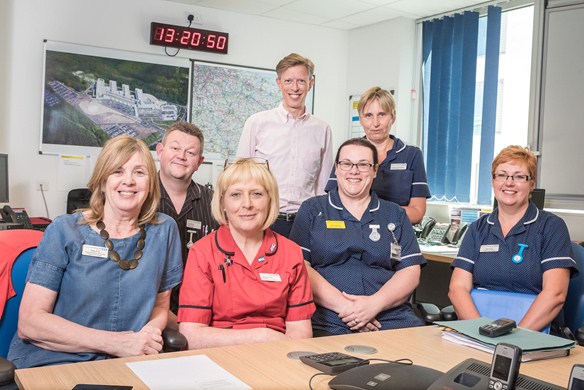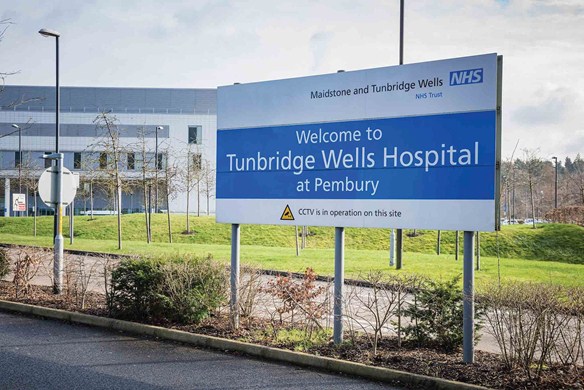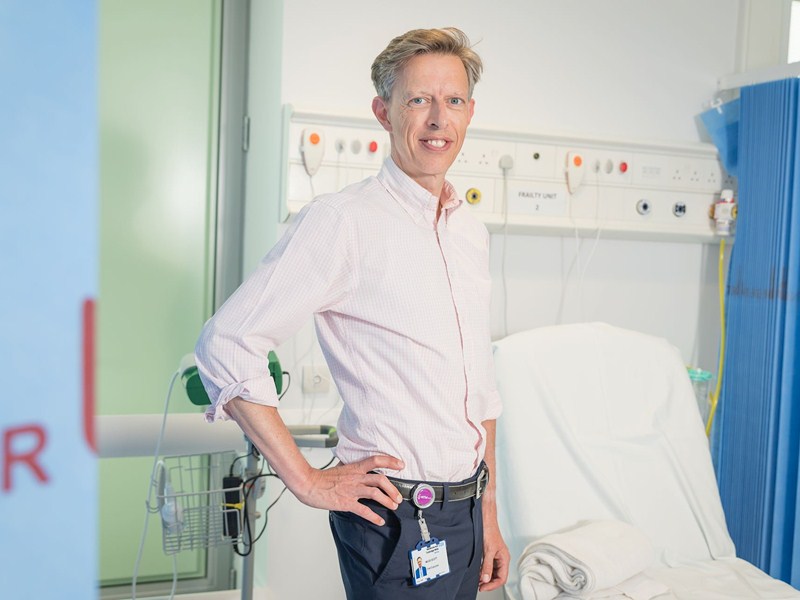WHETHER it be the Emergency Department, operation waiting times, or even the hospital car park, the buck ultimately stops with Miles Scott.
The experienced NHS manager was appointed Chief Executive of Maidstone and Tunbridge Wells [MTW] Trust in January, having previously worked in similar roles across the UK.
When he took over from Glenn Douglass as the full-time CEO, the Trust had most recently [in 2015] been rated as ‘requires improvement’ by the Care and Quality Commission [CQC].
MTW includes the Tunbridge Wells Hospital in Pembury, where Mr Scott spends two days a week, Maidstone Hospital and linked local healthcare centres.
Inspectors have since released a new report, which saw the Trust maintain the same rating – but could be seen to have made improvements.
Now with the Government promising an extra £20.5billion of NHS funding Mr Scott is looking to the future and told the Times reporter William Mata in an exclusive interview how he wants to turn fortunes around.
And readers will be happy to see that solving congestion in the hospital car park is something being looked into.
How has the first six months been since taking over?
I am loving it here. The great thing about MTW is that it has the opportunity to become one of the country’s outstanding hospitals and I really think that is achievable in a couple of years because we have fantastic facilities and fantastic staff. There are things we need to improve and develop, but all of the fundamentals are there.
There are some fundamentals you cannot do anything about, like the quality of building, the patient population and, most importantly, the right staff. All of the staff I speak to are so forward focused and thinking ‘what is the next thing I can do to make it better?’
The NHS has recently been promised £20.5billion of NHS funding a year. Is this enough?
Senior people in the NHS have argued it needs more money. We have been hear and that is appreciated. The Government has made money available and what we now need to do is really think hard about how we can make the best use of it. We are going to need to talk and engage with the general public about what we can do with that.

How would you like to spend the money?
With the new investment it is important we tackle some of the waiting times that build up. We have quite rightly put a huge priority into dealing with emergency patients.
The NHS has had a difficult time in the winter, but this hospital did better this winter than the previous winter. We cancelled fewer operations, we saw more patients more quickly. We got more patients in the right bed and in the facilities that were ideal for their needs.
Across the country there has been a big increase in emergency patients. Waiting times went down here and we bucked the trend. The whole of the NHS is rightly focused on getting things safe. With the new money we have to be able to deal with the waiting list.
Across the NHS, we have seen waiting lists rise. We are at a point now where they need to be addressed. We need to make sure we have the latest kit and make sure we invest a lot more in IT. Your readers will have a variable experience of basic bookings. We are used to dealing with high standards of responsiveness. We do not yet have that in the NHS.
So, will you be calling on the government for more funding?
The most important thing we do now is have a debate about what we are going to have. It is important we do that at a national and at a local level.
The CQC report in March said MTW requires improvement. What lessons have been learned?
I’m pleased the CQC recognised the improvements have been made. The overall rating stayed the same, but the detail behind that was transformed. The CQC said it is a different organisation to the one we came to in 2015. There are 80 individual ratings and we did not get a single one of those in the bottom measure. Last time we had a whole domain. Everything now is either ‘requires improvement’, of good. We had nothing in the bottom category.

Inspectors noted 17 things that ‘should be improved’. How many of these are now in order?
We have implemented improvements against all 17 of those. Some of those are complete. Some are having to go through a process to bring them up to scratch.
Would you be confident of getting a ‘good’ rating next time?
I would be very confident of getting a ‘good’ rating next time. Before they come back to do another comprehensive report they will make a visit. There were some services they did not see last time they will need to see again.
Readers have told us there is often little space in the hospital car park. They have reported having to park on verges or pedestrian area because there is nowhere else to go, and then have been fined. What steps are you taking to solve this issue?
When this hospital was built, the planning requirements that we had to work within meant that we had to build the hospital without enough car parking spaces. People will say ‘I told you so’ and they are right. That was then. The position we are now in is that we have had encouraging conversations with the borough council. If we can get planning permission to build more car parking spaces we will.
We are currently working out some detailed proposals around that. I want to encourage anybody who can use public transport to do so. I met with the whole council in Tunbridge Wells. I can’t announce anything but we had a positive conversation about what our needs are around affordable housing for our staff and about car parking.
How will you bring down Emergency Department waiting times?
The key indicator in the Emergency Department is what proportion of patients spend four hours or less in there. We are currently treating 95 per cent of our patients within the four hour target. That is the national standard, which has not been met for around four years. In the winter we were not quite at 95 per cent but we hit at least 90 per cent throughout the time I have been here. Recently we have been doing better than that. That is a big improvement on the previous winter.
Bed blocking has been estimated to cost the NHS around £3billion a year. Is this a problem at Tunbridge Wells and how can it be rectified?
An important part of what has been different is that the partnership we have with community services worked really well. Additional funding was put into finding additional facilities out in the community for some of the patients we have found difficult to discharge. There were also things inside the hospital. Dealing with patients who, in a medical sense, are ready to be discharged – the number of those patients has come down. We need it to come down further so we can deal with the increasing demand we face year on year. That demand is not going away.

A number of operations were postponed this winter or moved to Maidstone. How many scheduled operations were not performed in Tunbridge Wells?
What people experienced in many parts of the country was cancelling on the day before or on the day itself because of lack of beds. We were determined not to do that.
One thing we did was not issuing lots of dates for surgery, rather than cancelling operations at the last minute. We made sure we did as much operating as possible at Maidstone where there are more beds. We established a specialist ward that cannot be used for emergency patients. We manged to operate on 1,000 patients between January and the end of March.
Has the Trust now caught up with itself?
No. Our waiting lists have risen. That is because our capacity is fixed. Our emergency patients have risen. We have had to focus on the Emergency Department. We are in the process of doing that. We are not yet back to the waiting times we were able to provide before winter.
For cancer care the Trust is in the bottom ten in the country. How is this going to be improved?
We have got a challenge around some waiting times. It is important that our cancer centres have some of the best outcomes in the country. This is a good set of services for patients. But we have seen an increase in referrals for breast cancer and for neurological cancer. Some of that has been driven by media appeals for people to come forward, which is fantastic, it is what we want. But we haven’t just been able to expand the number of clinical points.
Across all of cancer GPs have been asked to reduce the level of ‘suspicion’ – they used to be told ‘send them in if they have a five per cent chance’. Now it is three per cent. We are the cancer centre for Kent. We attract a lot of referrals. Over the past year we have attracted more referrals at a greater rate. We need to find more efficient ways of finding the capacity. We are making lots of changes to the way we manage patients. We will also invest in capacity in certain areas. If there is one thing in the short term we are looking to improve it is our cancer access times. Clinical outcomes are really good but our access times are not good enough.

What proportion of the hospital’s staff are agency staff and how does this compare to other Trusts? How many vacancies does the hospital currently have? Has recruitment been a challenge for the Trust, and could this challenge become greater with Brexit?
Recruitment is a huge issue. As is retention. We are working hard on both, we are pleased to see there are some loosening of some of the Visa requirements of healthcare staff. There are not enough trained doctors and nurses in this country to deal with the needs of the NHS. For the foreseeable future the NHS is going to be reliant on being able to provide opportunities for people to come from overseas. The Government is opening the possibility to that at the moment.








